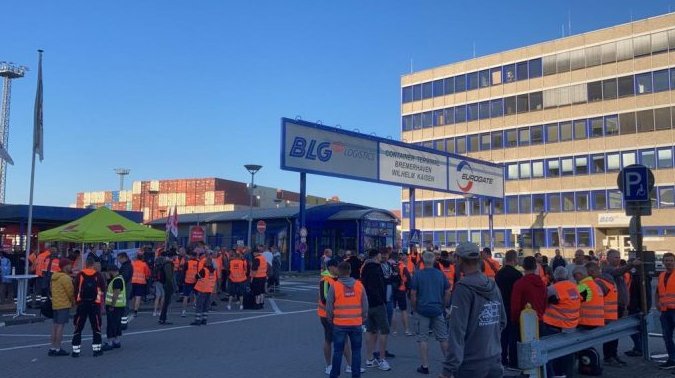German dockworkers began a 48-hour strike on Thursday as wage negotiations with their employers stalled.
The strike by about 12,000 workers, which will halt operations at major container hubs such as Hamburg, Bremerport and Port Wilhelm, will be the third and longest strike in an increasingly bitter wage dispute.
If the strike goes ahead, it will have a serious impact on the liner network and add to the already chronic supply chain congestion at The Nordic container hubs.
Dockworkers are understood to be stopping work at German ports from 06:00 on Thursday to 06:00 on Saturday in the country's longest dock strike in more than 40 years.

The strike action intensified last week after the collapse of a sixth round of talks between employers, the Central Association of German Seaport Companies (ZDS) and the union Ver.di.
Employers have not fully met our demands for real inflation compensation. We need a real inflation compensation so that all the company's employees are not left to bear the consequences of skyrocketing prices. ZDS 'earlier offer was a' classic scam '. The breakdown of talks does not rule out further strikes, rejecting the need for arbitration and demanding a renegotiation of permanent pay rises, which could be as low as 3.5% for the workforce in some sectors.
Despite the increasing offer, the union is not willing to compromise and we have responded to Ver.di's demands. A maximum 12.5 per cent offer is on the table, including a permanent 8 per cent increase retroactive to June 1. With this proposal, we exceed the very high rate of inflation and are well above the demands and conclusions of Ver.di and other unions in other current negotiations. We can't afford any more without endangering the survival of the company. Any further escalation of strike action would be totally disproportionate to this offer and would damage not only us but the whole of Germany. We urgently need a conciliation process.
In addition, METRANS announced on Saturday that it was suspending the operation of its export trains because of delays in the arrival of containers, which resulted in serious delays in receiving shipments.
Meanwhile, shipping companies are waiting to see if there are any last-minute detente or interventions to prevent further disruption to Nordic shipping operations. "We have nowhere else to handle German cargoes," said a shipping company contact in Felixstowe. "Antwerp and Rotterdam are full, so if that happens, I guess we'll have to wait in line," he said.
The United States faces a double threat of strikes
Strikes and slowdowns at ports in Germany, Belgium, the Netherlands and Asia are undermining trade and could trigger more logistical inflationary pressures in the US, where looming rail and trucker strikes could add to already growing congestion at the two largest US ports.
As the US faces the twin threat of rail and trucker strikes, ongoing negotiations between dockworkers' unions and employees on the West Coast are making many involved in the supply chain nervous, just as there are signs that ports on both coasts are once again overloaded.
Some gates at the Port of Long Beach will be closed for the duration of the strike. It will have an impact on the pick-up/return business!